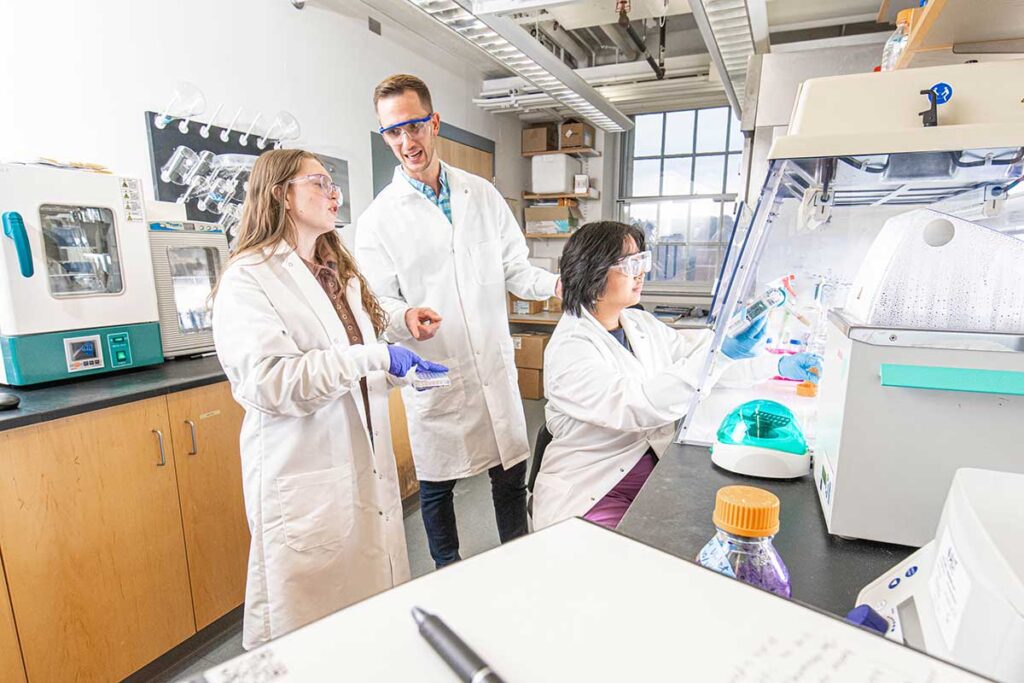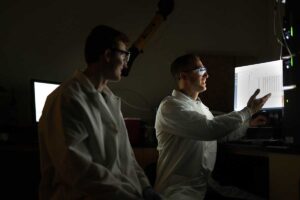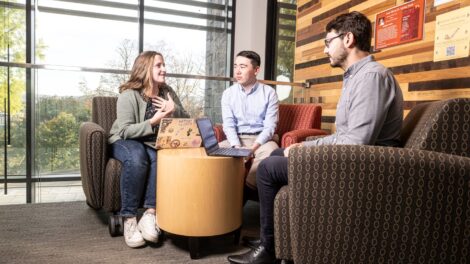Chemistry Prof. Michael Bertucci earns distinguished Henry Dreyfus Teacher-Scholar Award

Student-researchers Ryann Carlotz ’24 (left) and Alex Yurtola ’26 (right) discuss a result from their bacterial bioassay while conducting research with Prof. Michael Bertucci (middle).
By Stella Katsipoutis-Varkanis
Michael Bertucci, assistant professor of chemistry, is one of eight professors from colleges and universities across the U.S. to be named a 2023 Henry Dreyfus Teacher-Scholar. The prestigious award provides an unrestricted research grant of $75,000, which will not only support his work studying the effects of synthetic peptides on bacterial communication, but also further enhance the opportunities for his team of student-researchers to gain hands-on, graduate-level lab experience.
Awarded by The Camille & Henry Dreyfus Foundation, the honor recognizes young faculty members in the chemical sciences—including chemistry, biochemistry, materials chemistry, and chemical engineering—who have demonstrated leadership in original, outstanding-quality scholarly research substantially carried out with undergraduates, as well as innovation in and dedication to undergraduate education. Only one faculty member can be nominated for the award by each eligible institution per year.

Michael Bertucci, assistant professor of chemistry
“I am over the moon,” Bertucci says of his win. “Doing research in organic chemistry that can somehow have an effect on living systems has always been a passion of mine. Bacterial resistance to antibiotics is one of those scary things on the horizon that’s continuing to grow, and the data we get from our study allows us to learn about the communication networks in bacteria and develop chemical tools that other scientists can potentially use.”
Chip Nataro, Marshall R. Metzgar Professor of Chemistry and department head, who nominated Bertucci for the award, lauds him for having actively engaged students in lab research since joining Lafayette in 2021. “Prof. Bertucci has infused the Chemistry Department with overwhelming enthusiasm,” Nataro says.
Bertucci—who also was nationally recognized in 2022 when he received an NSF CAREER Award—earned the Dreyfus grant for his achievements in teaching and scholarship to date, as well as his proposed future research. As part of his nomination package, which he titled “Characterizing and Modulating Bacterial Quorum Sensing Systems with Synthetic Peptides,” he proposed embarking on a research study with longtime collaborator Yftah Tal-Gan, chemistry professor at University of Nevada, Reno. In this research, Bertucci and thus far seven Lafayette students have been working to design, synthesize, purify, structurally modify, and analyze peptides—or short chains of amino acids—that could potentially be used to inhibit cell-to-cell communication amongst a specific strain of bacteria called Streptococcus gordonii.
“S. gordonii is an opportunistic pathogen that naturally lives in our mouth, but can be problematic and harmful if it gets into our bloodstream,” Bertucci says. “The idea behind our research is to try to create a molecule that could inhibit that communication process—known as quorum sensing, which can promote things like the development of antibiotic resistance mechanisms—and mitigate the infectivity and negative impacts of the bacteria.”
After having collected preliminary data on peptides that could potentially hinder quorum sensing, Bertucci and his student-researchers are now taking next steps to even further manipulate those peptides to gain a deeper understanding of how much of them are needed to fully shut down the bacteria’s communication network.
In addition to helping provide supplies for the continuation of the research project, the Dreyfus grant will provide support for the Institute for PUI Faculty, which Bertucci established to help graduate and postdoctoral students from across the country interested in pursuing careers as professors at predominantly undergraduate institutions (PUIs) visit Lafayette and gain exposure to the PUI environment. It also will help fund more opportunities for members of his student research team to travel to University of Nevada, Reno in the summer to work alongside faculty and postdoctoral students, and conduct further experiments with the peptides they helped create.
“Going to Nevada was a truly amazing experience that I will always remember,” says Mallory Downs ’25, a neuroscience major and one of Bertucci’s student-researchers, who took the research trip in July. “Not everyone gets a chance to fly across the country to study something that interests them. I also made some great friends and contacts there that I was able to talk to about my career aspirations. As an undergrad, being able to work on such a high level of research has been invaluable to me.”

Michael Bertucci discusses data from a recent peptide purification with Braeden Beal ’25
Learning techniques for designing and constructing peptides, gaining an understanding of the instrumentation needed to analyze their work, seeing the tangible results of their efforts, traveling, and getting firsthand research experience that is typically reserved for graduate students aren’t the only benefits students glean from working with Bertucci. Along with contributing new knowledge to the chemistry field and presenting at national conferences, he says, they receive on-the-job training that isn’t gained in the classroom.
“I give them the space to solve problems themselves, and empowering them to move past those problems is the most important thing for me as their mentor,” Bertucci says. “These students are going to be well positioned for grad school by their senior year, and I wouldn’t be surprised if they’re craving an even greater challenge at that point, since they’ve already been doing research in my lab for years.”
The chance to work closely with a faculty member and be mentored by them, Downs explains, is perhaps her greatest takeaway from her research experience.
“Prof. Bertucci is so helpful and understanding as an adviser,” she says. “This experience has taught me to be independent, but also know when to ask for help. It has taught me about being open-minded and taking advantage of new opportunities. It has served me academically in helping me understand my pre-med classes, but it has also helped me be confident in my abilities as an individual. I have learned a lot about myself in the lab, which I never would have been able to without the support of Prof. Bertucci.”
The opportunity to form student-faculty bonds is likewise beneficial for Bertucci, he says, as it helps drive his research forward at a faster pace.
“It’s like a family environment, but it’s also really productive in terms of thinking about what we’re going to do next,” he explains. “Sometimes I might have an idea of what we should chase, but that can change based on the things they find and the questions they ask. Our students are accelerating the research in a way that helps the goals of the entire lab.”

